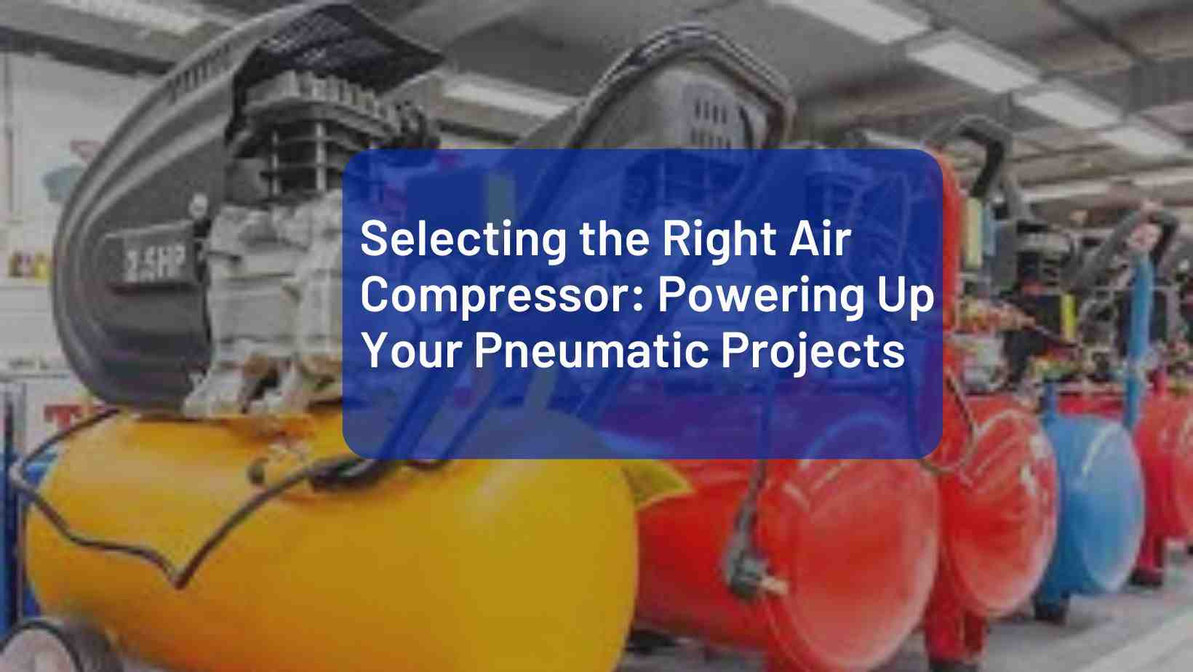Selecting the Right Air Compressor: Powering Up Your Pneumatic Projects
Imagine being deep into a crucial project and reaching for your trusty nail gun only to hear a sputter—a sure sign of an incompatible air compressor. The heart of many pneumatic tools, the air compressor, is critical for ensuring your equipment performs to its potential. This article explores essential factors to consider when choosing a suitable air compressor to enhance your project's efficiency and effectiveness. This article will make an appropriate selection of air compressors for your specification application a breeze.
Key Takeaway
The perfect air compressor does more than power your tools; it brings reliability, efficiency, and peace of mind to your projects. It’s a central component of your work environment, influencing not just the outcome of your projects but also the operational dynamics of your workspace. Investing wisely in this critical equipment means considering immediate needs and future growth, operational environments, and maintenance practices.
Unveiling the Key Players: CFM, PSI, and Tank Capacity
CFM (Cubic Feet per Minute):
CFM measures the volume of air that the compressor delivers at a specific pressure. It’s akin to the lung capacity of your air compressor, vital for the functioning of your tools. High-demand tools like sanders and impact wrenches, for instance, require compressors with a higher CFM rating to operate effectively.
PSI (Pounds per Square Inch):
PSI represents the pressure that your compressor exerts. Think of it as the force that pushes the air out of the compressor and into your tools. Most pneumatic tools are designed to operate at about 90 PSI, but certain specialty tools might need a higher pressure to function properly.
Tank Capacity:
The tank capacity indicates how much-compressed air can be stored within the compressor. Larger tanks provide a buffer of air, allowing for consistent tool operation and reducing the compressor's cycling times, which can be crucial for tools that require a continuous air supply.
Beyond the Basics: Unlocking Hidden Gems of Knowledge
While CFM, PSI, and tank capacity form the foundation of air compressor functionality, other factors are equally vital for a well-rounded tool selection:
Duty Cycle:
The duty cycle refers to how long a compressor can operate continuously before it needs a cool-down period. For example, a 50% duty cycle means the compressor should rest for one minute after every minute of operation. Selecting a compressor with a duty cycle that matches your workflow prevents overheating and extends the unit's lifespan.
Air Compressor Type:
- Piston Compressors: These are generally more cost-effective and are ideal for light-duty or intermittent use, making them suitable for home projects or small workshops.
- Rotary Screw Compressors: Known for their durability and efficiency, these are better suited for industrial applications where the compressor needs to run almost continuously.
Noise Level:
Operational noise can be a critical factor, especially in environments where noise pollution is a concern, such as residential areas or schools. Modern compressors often emphasize reduced noise levels to enhance user comfort and meet local noise regulations.
Insider Tips: Gleaning Knowledge from the Shadows
Selecting a suitable air compressor involves more than just matching specifications to your current needs. Here are some expert tips to consider that could provide substantial long-term benefits:
Future-Proofing Your Investment:
While your present needs might call for a specific capacity and power, it's wise to anticipate future demands. Projects often evolve, leading to requirements that may exceed your current setup. Choosing a compressor with a slightly higher CFM and tank capacity than what you currently need can prevent the necessity for an upgrade soon, thereby saving money and increasing efficiency in the long run.
Consult the Experts:
The variety of compressors available can make the selection process seem daunting. Engaging with knowledgeable professionals, such as those at Tend Industrial Supplies, can demystify the complexities. Their expertise can guide you through the nuances of each model and help match your specific needs with the right compressor, ensuring optimal performance for your projects.
Consider the Environment:
Think about where the compressor will be used. If it’s indoors or in a residential area, noise may be a significant concern. In such cases, looking for models specifically designed to operate quietly becomes crucial. Additionally, consider the space available for storing the compressor; compact or vertical models might be preferable in space-constrained environments.
Energy Efficiency Matters:
Opt for air compressors that boast high energy efficiency. These not only help reduce electricity costs but also minimize your carbon footprint. Models with variable-speed drives can adjust their motor speed to the demand, significantly enhancing energy efficiency.
Maintenance Accessibility:
Check how easy it is to perform regular maintenance tasks such as changing filters or oil (if applicable). Cumbersome compressors may lead to skipped maintenance sessions, degrade efficiency and shorten the device's lifespan.
After the Purchase: Ensuring Longevity and Performance
Regular Maintenance:
Establish a consistent maintenance routine to ensure your air compressor operates efficiently for years to come. Check and clean air filters regularly, drain tanks of moisture, and change the oil (for oil-lubricated models) according to the manufacturer's recommendations.
Monitoring Usage:
Keep an eye on the compressor's operating conditions, mainly if it's used frequently. Overworking the compressor can lead to premature wear and tear, while underuse can cause mechanical issues over time.
Installation Considerations:
Proper installation is critical. To prevent overheating, ensure your compressor is set up in a well-ventilated area. Additionally, ensure it's mounted securely; vibrations can cause mechanical wear or structural damage over time.
Let’s take a brief pause here. Next, we will wrap up with final thoughts, including key takeaways and a call to action to visit Tend Industrial Supplies for your compressor needs. We'll also answer frequently asked questions that might help clarify any remaining uncertainties about selecting the suitable air compressor.
Powering Success with the Right Tools
Choosing a suitable air compressor is crucial for ensuring the effectiveness of your pneumatic tools, enhancing overall productivity, and maintaining workflow continuity. You can select a compressor that meets and exceeds your expectations by considering factors such as CFM, PSI, tank capacity, duty cycle, compressor type, noise level, and future project requirements. Moreover, engaging with expert advisors from a trusted supplier can further refine your choice, ensuring that you invest in a product that aligns with your needs.
Call to Action
Ready to elevate your project capabilities with a high-quality air compressor? VisitTend Industrial Supplies today to explore our extensive range of air compressors. Whether you’re looking for a robust industrial solution or a more compact setup for smaller projects, we have something to suit every need. Don't hesitate to contact us at sales@tendsupplies.com for personalized advice and recommendations. Equip your workspace with Tend Industrial Supplies and experience the difference in power and performance.
FAQs
- What is CFM, and why is it important?
- CFM (Cubic Feet per Minute) measures the volume of air that the compressor can deliver at a specific pressure. It's crucial because it determines the number and type of tools you can operate simultaneously.
- How do I know if an air compressor is energy efficient?
- Look for compressors equipped with energy-saving features such as variable speed drives (VSDs) that adjust motor speed to air demand. Also, check for any energy efficiency ratings or certifications.
- Can I use a single-stage compressor for professional auto painting?
- A two-stage compressor, which can provide a steadier air supply and higher PSI, is generally recommended over a single-stage compressor for professional auto painting.
- How often should I perform maintenance on my air compressor?
- Maintenance frequency can vary depending on the model and usage but generally includes daily, weekly, and monthly checks and cleanups. Always refer to the manufacturer’s guide for specific maintenance schedules.
- What should I do if my air compressor starts making a strange noise?
- Unusual noises can indicate various issues, from loose parts to internal wear. Turn off the compressor immediately, check for any visible issues, like loose components, and consult a professional if the problem persists.
By selecting a suitable air compressor and maintaining it properly, you can ensure that it performs efficiently and lasts for many years, maximizing your investment and enhancing your operational capabilities. With Tend Industrial Supplies, you can equip yourself with the knowledge to make informed choices and the tools to execute your projects flawlessly.
Recent Posts
-
Air Compressor Noise Reduction Techniques
Air compressors are invaluable in various industrial, commercial, and residential settings, powering …30th Apr 2024 -
Air Compressor Safety Guidelines: Ensuring Safe Operation in Every Use
Air compressors are powerful machines used in various industries, from manufacturing to construction …30th Apr 2024 -
High-Pressure Air Compressors Explained: Powering Demanding Applications
High-pressure air compressors are pivotal in various industries, from automotive manufacturing to en …30th Apr 2024





